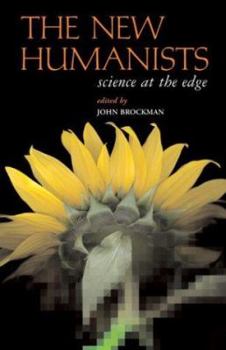The New Humanists: Science at the Edge
Some of the top scientists of today--the geographer Jared Diamond, the linguist Steven Pinker, the philosopher Daniel Dennett, Marvin Minsky, Lee Smolin, among others--discuss the unique contributions... This description may be from another edition of this product.
Format:Hardcover
Language:English
ISBN:0760745293
ISBN13:9780760745298
Release Date:August 2003
Publisher:Sterling
Length:408 Pages
Weight:1.35 lbs.
Dimensions:1.3" x 5.5" x 8.9"
Customer Reviews
3 ratings
Science on the cutting edge.
Published by Thriftbooks.com User , 20 years ago
E. O. Wilson said, "the greatest enterprise of the mind has been and always will be the attempted linkage of the sciences and the humanities" (CONSILIENCE, Knopf, p. 8). In the Introduction to this collection of scientific essays, John Brockman (founder of the EDGE intellectual forum) asserts that humanity would be much better off if it were more scientifically literate. A Florentine, he observes, understood that to read Dante but to ignore science was ridiculous. Da Vinci was not only a great artist, but a great scientist and technologist as well. Similarly, Michelangelo both a great artist and and engineer. For Brockman, "the idea of embracing humanism while remaining ignorant of the latest scientific and technological achievements" is "incomprehensible" (p. 2). (For those interested in this topic, Stephen Jay Gould attempted to reconcile science with the humanities in final book, THE HEDGEHOG, THE FOX, AND THE MAGISTER'S POX.) Brockman has collected essays from the top scientists of our time exploring cutting-edge developments in molecular biology, genetics, nanotechnology, artificial intelligence, chaos theory, artificial life, the inflationary universe, fractals, complex adaptive systems, linguistics, superstrings, biodiversity, the human genome, cellular automata, fuzzy logic, virtual reality, cyberspace and computer technology. Science geeks (like me) will be pleased to find contributions here from Helena Cronin (evolutionary biologist), Daniel C. Dennett (philosopher), Jared Diamond (biogeographer), Ray Kurzweil (technologist), Richard Wrangham (biological anthropologist), Stephen M. Kosslyn and Steven Pinker (psycholgists), Andy Clark and Marc D. Hauser (cognitivite scientists), Rodney Brooks, David Gelernter, Jaron Lanier (computer scientists), and David Deutsch, Alan Guth, Martin Rees, and Lee Smolin (physicists), among others, each redefining what it means to be human, and each offering a deeper understanding of human life. More than just a collection of scientific essays, this book is a fascinating travel guide through our brave new world of science and technology. G. Merritt
For a good whetting of the appetite!
Published by Thriftbooks.com User , 20 years ago
What we have here is an excellent collection of scientists and philosophers writing articles about the latest research programmes in physics, artificial intellegence, cognitive science, and evolutionary biology. All of these contributers are members of www.edge.org, which is a forum for 'leading minds' to converge and converse on what the latest programmes, excitements, and theories in their field are. What I thought I'd find is cocksure scientists writing in a clamour about their ultimate victory in the science wars and how this would inevitably lead to a reductionistic view of everyhing and anything. (Call me cynical, but the popular science market has been doing a lot of this lately). I did find a little of that only a little); by in large, though, the focus was simply on what certain fields were really doing, how it MAY affect other fields and the general populace, and overall abstainment when it comes to grand proclomations. No 'theories of everything', 'consciliences' that repeat Wilson's mistakes of wanting to 'scientize' all other disciplines, and no cockiness.All that having been said, this book is absolutely thrilling. These scientists (the likes of Dennett, Pinker, Minsky, and Smolin) are writing fasinating essays of very promising theories in their fields and their roles in hashing them out. Can universes organize themselves? What are animals really thinking? Is the brain reducible to algorithms and if so, could machines achieve a first person experiencial perspective? How malleable is human nature?If you are like me and REALLY excited about these questions and hearing scientists - if not answering them - discussing what answers might look like, then this book is a fantastic exploration. The big winners, you ask? In my humble opinion Jaron Lanier's essay on scientism and AI takes the cake; also Dennett's article delineating the intentional stance is good. David Deutch does an excellent job writing on quantum computation as doe Marvin Minsky on why AI might want to rethink how it looks at the mind. The last 30-or-so pages is a miscelleneous collection of thoughts by leading scientists and philosophers in response to John Brockman's lead off essay discussing the relation of science and humanities. Again, Laneir comes off the most thoughtful and thought-provoking (ironically he is the only contributor WITHOUT a formal degree) but the rest of the responses are insightful and well written. If you want to explore a variety of fields, points of view, and ideas, this is a tremendous book. Brockman and the contributors certainly did science and society a service in putting this one together.
Humanists or humanoids?
Published by Thriftbooks.com User , 20 years ago
It is sad but true that modern scientific culture is incapable of producing a genuine humanism. Between scientific reductionism and the confusions of Darwinism the era of science prospers in physics, but produces idiotic accounts of man, his nature and psychology. What's worse, these issues are very old and systematically studied in the generations after Newton where the limits of his achievement were quickly foreseen. All this has been forgotten in the current paradigm milieu where resurgent positivistic fundamentlism has decided to make all the old mistakes all over again. The educational system reinforces this mindset, and the worst of it is that intelligent technically inclined students are conditioned to a one dimensional view that is blind to the basic fact that science cannot in its current form stand as a foundationalism for the totality of human knowledge. This otherwise interesting selection of essays rounds up the wannabe candidates for another round of Frankenstein humanism that won't amount to anything.





